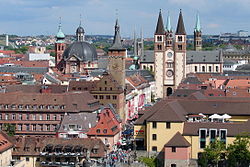Würzburg
| Würzburg | ||
|---|---|---|

Würzburg with cathedral and city hall
|
||
|
||
| Coordinates: 49°47′N 9°56′E / 49.783°N 9.933°ECoordinates: 49°47′N 9°56′E / 49.783°N 9.933°E | ||
| Country | Germany | |
| State | Bavaria | |
| Admin. region | Lower Franconia | |
| District | Urban district | |
| Government | ||
| • Mayor | Christian Schuchardt (CDU) | |
| Area | ||
| • Total | 87.63 km2 (33.83 sq mi) | |
| Population (2015-12-31) | ||
| • Total | 124,873 | |
| • Density | 1,400/km2 (3,700/sq mi) | |
| Time zone | CET/CEST (UTC+1/+2) | |
| Postal codes | 97070–97084 | |
| Dialling codes | 0931 | |
| Vehicle registration | WÜ | |
| Largest groups of foreign residents | |
| Nationality | Population (2014) |
|---|---|
|
|
1,176 |
|
|
821 |
|
|
773 |
|
|
759 |
|
|
677 |
|
|
547 |
|
|
415 |
|
|
354 |
|
|
323 |
|
|
305 |
Würzburg (German pronunciation: [ˈvʏɐ̯tsbʊɐ̯k]; Main-Franconian: Wörtzburch) is a city in the region of Franconia, northern Bavaria, Germany. Located on the Main River, it is the capital of the Regierungsbezirk of Lower Franconia. The regional dialect is Franconian.
Würzburg lies about equidistant from Frankfurt am Main and from Nuremberg (each about 120 kilometers or 75 miles away). Although the city of Würzburg is not part of the Landkreis Würzburg, (i.e., district of Würzburg), it is the seat of the district's administration. The city has a population of around 124,000 people.
A Bronze Age (Urnfield culture) refuge castle stood on the site of the present Fortress Marienberg. The former Celtic territory was settled by the Alamanni in the 4th or 5th century, and by the Franks in the 6th to 7th. Würzburg was the seat of a Merovingian duke from about 650. It was Christianized in 686 by Irish missionaries Kilian, Kolonat and Totnan. The city is mentioned in a donation by Duke Hedan II to bishop Willibrord, dated 1 May 704, in castellum Virteburch. The Ravenna Cosmography lists the city as Uburzis at about the same time. The name is presumably of Celtic origin, but based on a folk etymological connection to the German word "herb, spice", the name was Latinized as Herbipolis in the medieval period.
...
Wikipedia


